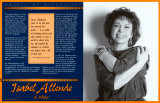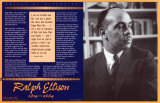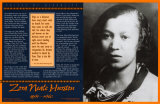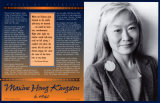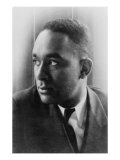|
|
Voices of Diversity Social Studies & Literature Posters
for the classroom and home schoolers.
|
social studies > VOICES OF DIVERSITY < literature posters
|
|
The “Voices of Diversity” poster series celebrated prominent authors who have made significant contributions to American culture through their literature: Sherman Alexie, Isabel Allende, Ralph Ellison, Zora Neale Hurston, Maxine Hong Kingston, Toni Morrison, Elie Wiesel, and Richard Wright.
|
|
|
Sherman Alexie
b. 10-7-1966; Spokane, WA
Poster Text: “The word gone echoes all over the reservation. The reservation was gone itself, just a shell of its former self, just a fragment of the whole. But the reservation still possesses power and rage, magic and loss, joys and jealousy. The reservation tugged at the lives of its Indians... But the reservation forgave, too.” - Reservation Blues
“According to TV and the movies, Indians don't exist past 1950.” says Sherman Alexie, a Spokane and Coeur d'Alene Indian. Growing up, Mr. Alexie couldn't identify with the stereotyped images that he saw of Native Americans. Now Mr. Alexie is working to remove those stereotypes with is writing about modern Native Americans.
Sherman grew up in Wellpinit, Washington, the main community of the Spokane Indian Reservation. “I was a weird, nerdy little kid,” he says, and he felt isolated from the rest of the community. He spent a lot of time alone, reading. “I'd read the entire reservation library by the time I was 15,” he says. “I read everything I could get my hands on – cereal boxes, catalogues, instruction books, you name it.”
But even though books were very important to him, he almost didn't become a writer, He planned to study medicine at Washington State University, but changed his mind after he fainted three times in human anatomy class. So he enrolled in the only open class: a poetry workshop. the first assignment was to write five poems. “I went home and did it, and it hasn't stopped yet.” Those poems can be found in his first book poetry. The Business of Fancydancing, which was published in 1992. Since then, he has published a variety of works including. The Lone Ranger and Tonto Fistfighting in Heaven – a short story collection – and the novel Reservation Blues. He also wrote the screenplay for the film Smoke Signals, which was based on one of his short stories, and which was the first feature film written, co-produced, and directed by Native Americans.
Mr. Alexie's work often focuses on the harsh realties of reservation life – including alcoholism on poverty. “I'm not in [writing] to make people happy or to make people feel good about the world.” he says. “First and foremost, I want to talk about universal conditions.” But although his writing deals with serious subjects, it's also filled with humor. “Indians are funny, the funniest people on the planet,” he says, "They have to be."
• more Native Americans posters
|
|
|
|
Isabel Allende
b. 8-2-1942; Lima, Peru
“Clara's childhood came to an end and she entered her youth...in a world of terrifying stories and calm silences. It was a world in which time was not marked by calendars or watches and objects had a life of the own.”- The House of the Spirits
“I've always told stories,” says Isabel Allende. “They used to call me a liar. Now that I write books, they call me a narrator.” That gift for storytelling has made Ms. Allende one of the most celebrated writers to come out of Latin America. Her books have sold more than ten million copies and have geen translated into 27 languages.
Isabel Allende was born in Peru, but when she was young, her family went to live with her grandparents in Chile. Her grandfather was very strict – he wouldn't even allow a radio in the house. Instead, Isabel spent her time in the basement, where she devoured hundreds of books, “Reading . . . was my time, my space, my universe,” she says.
Ms. Allende became a well-known journalist. But her life changed forever in 1973 when her uncle, Salvador Allende Gossens, the president of Chile, was killed in a military coup. Ms. Allende fled to Venezuela in 1975.
Her first novel, The House of the Spirits, was published when she was 40. It started out as a letter to her dying grandfatehr. “He believed that people only really died when they were forgotten.” she says. “I began writing him the memories that would keep him alive for me.” Many of the characters are based on her own family, including her grandmother, who, Ms. Allende says, was clairvoyant, and could move objects without touching them. The House of the Spirits, like much of Ms. Allende's fiction, incorporates magic realism, a literary style where seemingly impossible things occur in everyday life.
In 1987, Ms. Allende moved to California. As an exile from Chile, and as a non-white woman living in an adopted country, she sees herself as an outsider. But she believes this helps her writing. “As an outsider, I'm in a privileged position. While everyone else takes everything for granted, I'm always asking questions. I get unusual answers.”
• more Isabel Allende posters
|
|
|
|
Ralph Ellison
b. 3-3-1914; Oklahoma City, OK
d. 4-16-1994
Poster Text: Ralph Ellison only published three books during his life. Yet he is one of the greatest writers of the 20th century, and some say his novel Invisible Man is the most important American work written after World War II.
Ralph was born in Oklahoma City. His family was poor, but his parents encouraged him, and he saw himself as a “Renaissance man” who could accomplish anything. Ralph's father died when Ralph was young. His mother worked as a maid for white families and brought home old books, magazines, and records. Mr. Ellison said that these things “spoke to me of a life which was broader and more interesting – and of a word which I could some day make my own.”
Ralph read everything from fairy tales to Freud, but he thought he would grow up to be a musician. He studied music and played the trumpet at Tuskegee Institute in Alabama. But a mix-up over his scholarship caused him to leave school and move to New York City in 1936. On his second day there, he met the poet Langston Hughes, who introduced him to the novelist Richard Wright. Soon, Mr. Ellison began writing reviews and short stories. Then in 1945, he wrote down these five words: “I am an invisible man.” These words became the beginning of his masterpiece.
Invisible Man is about an African American man who feels invisible because people can't see who he is beyound the color of his skin. Although the novel centers on racial issues, it is also about feeling cut off in modern society – regardless of race. Mr. Ellison drew this writing style from authors like James Joyce and Ernest Hemingway, as well as from African American folklore and jazz and blues music. In 1953, Invisible Man wone the National Book Award, making Mr. Ellison the first African American author to win this prize.
Despite the success that Invisible Man brought him, Mr. Ellison's second novel, Juneteenth, wasn't published until five years after his death. Still, there is no denying the force of his impact on our society. Writing, he said, “offers me the possibility of contributing not only to the growth of the literature, but to the shaping of the culture as I should like it to be.”
“I am an invisible man. No, I am not a spook like those who haunted Edgar Allan Poe. ... I am a man of substance, of flesh and bone, fiber and liquids – and I might even be said to possess a mind. I am invisible, understand, simply because people refuse to see me.” Invisible Man
• more Ralph Ellison posters
|
|
|
|
Zora Neale Hurston
b. 1-7-1891; AL (raised in FL)
d. 1-28-1960
“Ships at a distance have every man's wish on board. For some they come in with the tide. For others they sail forever on the horizon, never out of sight, never landing until the Watcher turns his eyes away in resignation, his dreams mocked to death by Time. That is the life of men.” Their Eyes Were Watching God
• more Zora Neale Hurston posters
|
|
|
|
Maxine Hong Kingston
b. 10-27-1940; Stockton, CA
“When we Chinese girls listened to the adults talk-story, we learned...we could be heroines, swordswomen... Night after night my mother would talk-story until we fell asleep. I couldn't tell where the stories left off and the dreams began, her voice the voice of the heroines in my sleep.”
-The Woman Warrior
• more Maxine Hong Kingston posters
|
|
|
|
Toni Morrison
b. 2-18-1931; Lorain, OH
Poster Text: I my mother was in a singing mood, it wasn't so bad. She would sing about hard times, bad times, and somebody -done -gone -and -left -me times. But her voice was so sweet and her singing-eyes so melty I found myself longing for those hard times. The Bluest Eye
Many people say that Nobel Prize-winning author Toni Morrison is more than a great writer – she is an artist. “She paints pictures with words,” says opera singer Leontyne Price. “And reading or hearing those words is like listening to music.”
Toni Morrison was actually born Chloe Anthony Wofford. Toni was a nickname she got in college at Howard University. Ironically, naming, and the importance of names, are major themes in here writing. Although she grew up poor in the steel mill town of Lorain, Ohio, Toni's parents made sure she never felt inferior to anyone else. “I felt like an aristocrat – or hwat I think an aristocrate is,” she says. Early on, she learned the power of words. Toni was one of three black students in her first grade class – and the only student could read. As she got older, she read everything from Tolstoy to Flaubert to Jane Austen.
As an adult, Ms. Morrison worked as a book editor, helping to publish important works by and about African Americans. And she worked on her own writing. Her first book, The Bluest Eye, is about an African American girl who believes that her bleak life would be transformed in she had blue eyes. It received a lot of praise, but her third novel, Song of Solomon, cemented her reputation and won the 1977 National Book Critics Circle Award, Beloved, the story of an escaped slave who kills her infant daughter rather than see her in slavery, brought even further acclaim, winning the 1988 Pulitzer Prize for fiction. And in 1993, Ms. Morrison became the first black women and the first African American to receive the Nobel Prize for literature.
Ms. Morrison's work forcuses on black culture and society, and in identity and community. And she feels that being a black woman has helped her as a writer. “I really think the range of emotions and perceptions I have had access to as a black person and a female person are greater than those of people who are neither,” she says. “My world did not shrink because I was a black female writer. It just got bigger.”
• more Toni Morrison posters
|
|
|
|
Richard Wright
b. 9-4-1908, near Natchez, MS
d. 11-28-1960
"I would hurl words into this darkness and wait for an echo, and if an echo sounded, no matter how faintly, I would send other words to tell, to march, to fight, to create a sense of hunger for life that gnaws in us all, to keep alive in our hearts a sense of the inexpressibly human.” American Hunger
• more Richard Wright posters
|
|
|
previous page | top | more Diversity Motivational posters
|
|
I have searched the web for visual, text, and manipulative curriculum support materials - teaching posters, art prints, maps, charts, calendars, books and educational toys featuring famous people, places and events - to help teachers optimize their valuable time and budget.
Browsing the subject areas at NetPosterWorks.com is a learning experience where educators can plan context rich environments while comparing prices, special discounts, framing options and shipping from educational resources.
Thank you for starting your search for inspirational, motivational, and educational posters and learning materials at NetPosterWorks.com. If you need help please contact us.
|
|
|









